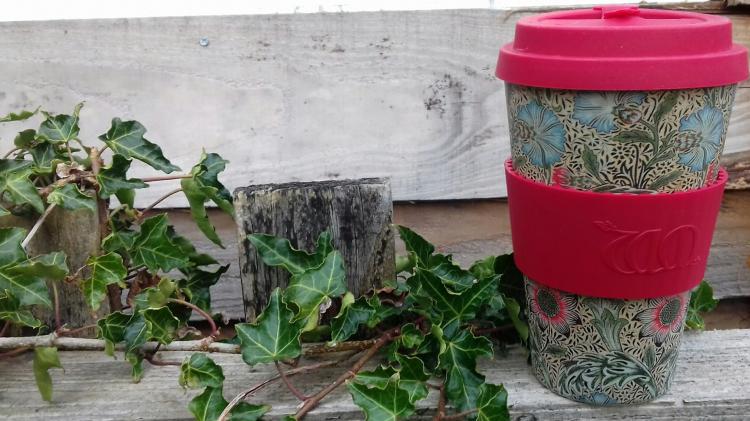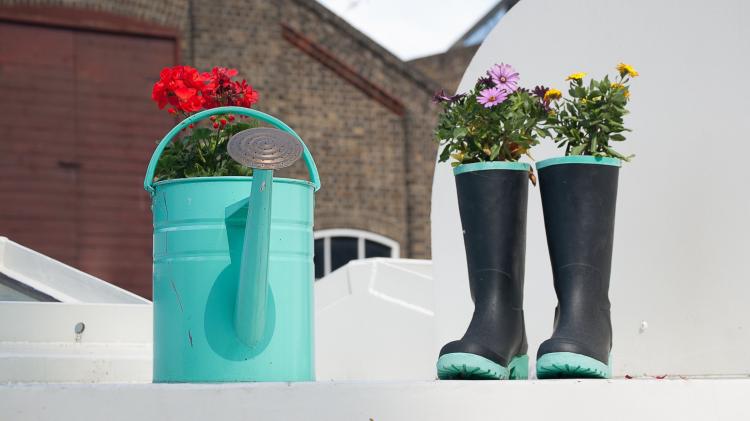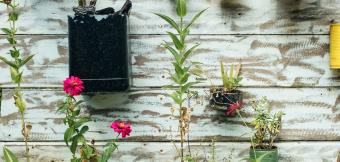
Refuse, reduce, reuse, repair & recycle
Recycling gets a lot of attention, but it’s the least effective of the 5Rs. We need to be doing more refusing, whether it’s excess packaging, cheap goods that won’t last, or just simply something we don’t need. Take what you have already and make it last, or give it a new lease of life.

Almost everything we buy and use in our daily lives has a carbon footprint: from its manufacture to its transport. And almost everything we buy ends up being thrown away at some point. It goes to landfill, becomes litter, pollutes our oceans, contributes to the emission of greenhouse gases, or harms the planet in other ways. We need to cut our consumption to reduce our environmental impact. Single use items make no sense for our wallets or the environment.
What are the 5 Rs?
Adapted from: How well do you know the 5Rs, 1MillionWomen
Most people are familiar with the 3 Rs of Reduce, Reuse and Recycle, but now there's two more to add to the mix: Refuse and Repair. It makes sense to approach them in order, with the most effective option you can take first, which is Refuse.
Refuse
Our lives are full of stuff we don't need, and everything has an environmental cost. Even a simple action such as refusing a disposable coffee cup in favour of your re-useable one can make a significant difference over time. Globally we use 16 billion disposable coffee cups every year and they are extremely difficult to recycle due to the paper inside being coated with plastic.
If you do need to buy things, do it thoughtfully, and use your spending power to tell companies what you want and don't want. For example, items that are built to last or those with less plastic packaging.
Reduce
- Reduce your overall consumption by questioning significant purchases and resisting impulse buying. Before buying a one-off item, give yourself at least a day or two to think it over. You might not need it as much as you thought.
- Always carry a re-useable shopping bag and choose stores which allow you to bring your own containers to fill from bulk supplies, such as cereals, oils and shampoos: check out Zero Waste Near Me in the UK. Consider getting together friends and neighbours to create a shared buying group, such as through Suma in the UK, who sell food and household items in bulk.
- Never buy single use plastic bottles - check out Refill in the UK to see where you can refill a re-useable bottle for free.
- Buy items that are made to last - be it technology or clothes, so you don't have to replace them as often. This might costs a bit more initially, but usually balances out over time.
- Consider growing some of your own food, even if it’s simply cut and come again salads on your window sill. This reduces packaging, waste and energy costs in transporting food. Bagged salads are one of the food items people throw out the most as they’re often forgotten at the bottom of the fridge.
- Try Kon-mari, a Japanese technique which means only keeping what is joyful in your life. It’s is a more mindful approach to clutter-clearing, as it forces us to ask ourselves ‘what sparks joy (tokimeku)?’

Reuse
Ditch disposable for reusable every time. Reusing an item is how previous generations made the most of limited resources in less wealthy and consumer-convenient times. However, modern society is geared towards throwaway items, be it food packaging or the latest fashion, so it can take a real shift to make a conscious choice to buck the trend.
Disposable nappies (diapers) take 200 years to decompose and by the time a child is two they could have used 5,000. However, the environmental benefits of reusable nappies could be cancelled out by the water and energy required to clean them, so dry them naturally and don’t use the hottest wash, making them 40% better for the environment.
Consider switching to re-useable sanitary pads or menstrual cups. The cups can last up to 10 years, fabric pads can be bought or handmade, and both have far less dioxins from cotton bleaching, put less waste into our oceans and cost less over time.
Reusing encourages you to be more creative and reduces the demand for more resources. It can also save you money: cut up used yoghurt pots as plant labels; rinse out glass jars for storage; turn vegetable peelings into compost; or make shredded paper into hamster bedding.
Rather than buying new clothes every season, think about how you can re-style or re-purpose clothes. Think about whether you need to buy brand-new and if you do, buy quality items that are made to last. Create a ‘virtuous circle’ with the clothes you wear by taking your old clothes to charity/thrift stores and buying second hand. You could organise a ‘swishing’ event where people bring clothes to swap with each other.
Repair
Too many items are thrown away simply because we don’t know how to fix them, it’s too expensive to do so, or they have been designed to become obsolete. This is especially prevalent in technology such as phones, so look for ethical alternatives such as Fairphone. Avoid anything that is not built to last if possible. If you can’t fix it, consider turning it into something else.
Upcycling, i.e. giving a new lease of life to a neglected item, is an art movement in itself, with tutorials online and articles in magazines about everything from creative use of garden planters to large-scale artworks made from recycled objects. But you don’t have to be artistic to upcycle: simply take something and alter it for another practical use i.e. an old pallet into a shelving unit.
Your junk may well be someone else’s treasure, so before you throw it out check to see if anyone else could make use of it through online sites such as Freecycle, Preloved and Gumtree.
Repair cafes began in Amsterdam 10 years ago and there are now over 1,700 worldwide. They are free community meeting places with tools and materials to help repair clothes, furniture, electrical appliances, bicycles, crockery, appliances, toys, etc. Visitors bring their broken items and, with the specialist volunteers, fix them. Right to Repair also campaigns for consumer's rights to repair what they own.
Recycle
When you've tried everything else, it's time for the final R, recycle. Recycling processes have their own carbon footprint, and dealing with our waste has a knock on effect on other countries as pollution levels rise. China may have refused to take any more of the world's recycling, but others have already stepped in to fill the gap.
Recycle everything you can. Anything made from metal, wood, most plastics, paper and electronic e-waste are all likely to have a recycling option. Familiarise yourself with what you can recycle in your kerbside bin and what might need to be taken to the dump/tip instead. Be aware that what you recycle can affect how efficient a whole truck's worth of recycling can be, so recycle wisely.
Try not to buy anything in packaging that cannot be recycled. And look to buy recycled goods made from waste paper, old rubber tyres etc.
Buy to last
If you have the money, just about everything can be bought, disposed of, and bought again. It’s tempting to treat these items as commodities. But everything we buy has both a history and a future, and often neither are positive for our climate or those involved in the supply chain.
When you make a significant purchase and have exhausted all the other options, invest in good quality, well-made items that are built to last. Very few cheap plastic items are likely to be handed down the generations!
Making that shift in mindset isn't difficult, but it does require research. Learning which reviews to trust and balancing out best value and ethics take time, but will pay dividends later. Check out websites such as Buy Me Once, which was set up as a counter to our throwaway society and sources items that are built to last.
Next steps
If you'd like to take the 5Rs even further, explore the Circular Economy.
It's a new way to design, make and use things within our planet's boundaries and a complete paradigm shift from how most people view consumption and waste today. By designing out waste and pollution, keeping products and materials in use, and regenerating natural systems, we can reinvent everything and reduce the environmental impact. The Ellen MacArthur Foundation's mission is to help bring about this change.
Picture credits: 1) Martin Waalboer/Repair Café International Foundation 2) Sarah Cossom 3) Iris Luis Bustamante - Pixabay
Always carry a re-useable cup and cutlery with you
Don’t buy over-packaged and/or poor quality goods
Set up a local repair cafe or community composting scheme
Lobby for clear standard recycling guidelines and transparency about where waste goes and how it's processed



